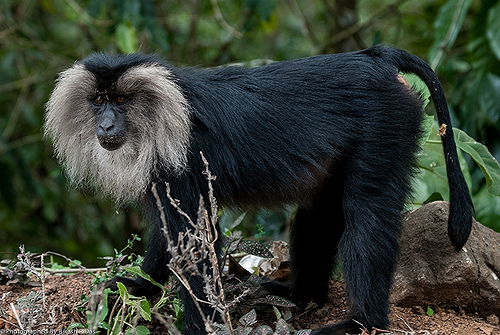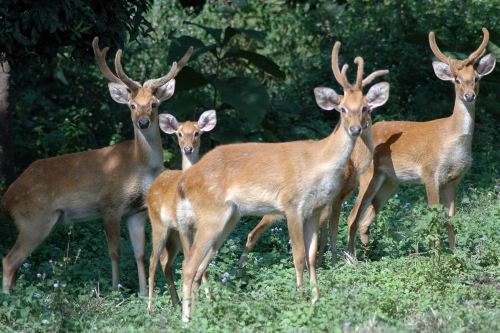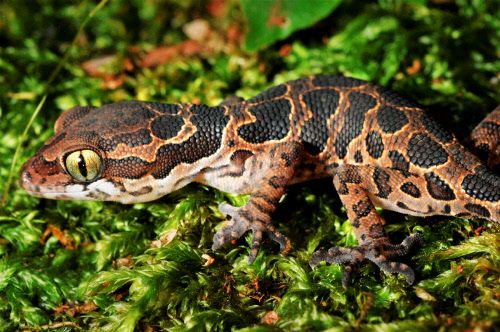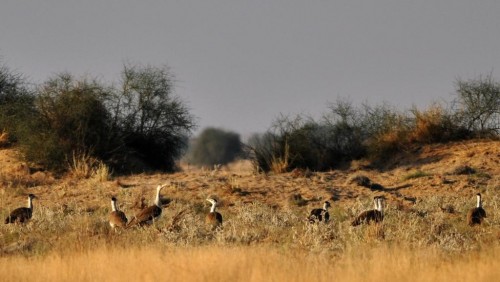First they lost their homes to humans and now the endangered Lion tailed Macaques endemic to Western Ghats of India are becoming more prone to infections thanks to close proximity to humans. A new study published Wednesday reveals how macaques forced to live on the ground and near human settlement have many new parasites found in their stomach, than earlier.
The study published in the journal PLos One and funded by the Government of India’s Department of Biotechnology shows how the rare macaques that hardly leave their tree-top homes are now forcefully adapting to live near human settlements and are becoming more vulnerable to a variety of gastrointestinal parasites.
The study was carried out by researchers Shaik Hussain, Muthuvarmadam Subramanian Ram, Sisinthy Shivaji, and Govindhaswamy Umapathy of the Hyderabad-based Laboratory for the Conservation of Endangered Species attached to the Council for Scientific and Industrial Research (CSIR) and Ajith Kumar from the Centre for Wildlife Studies attached to the Bangalore-based Wildlife Conservation Society.
Under Attack
The natural habitat of the Lion tailed Macaques is the Annamalai Hills in the Western Ghats, a world heritage site. They are also found in Kerala and Karnataka in the upper canopy of primary tropical evergreen rainforest.
The monkeys love to gather fruits or insects in these forests, but over the years, the trees have been either chopped down for timber needs or the wild forests has been replaced with exotic plantation such as tea, coffee and eucalyptus.
The macaques have also been forced to feed not on the wild growing berries but man-made fruit forests such as guava, jackfruits, passion fruit and others. It is this distorted living and feeding behaviour that is the root cause of what the scientists now find worrying.
When the researchers studied the lion tailed macaque population living in the Annamalai hill of Tamil Nadu, they noted nine gastrointestinal parasites and six of them were found only in lion-tailed macaques living near human settlements.
“High prevalence and species richness of gastrointestinal parasites are directly linked to habitat fragmentation, high anthropogenic activities (caused due to human activity), and high host density,” the study says.
The study further warns that this increase in parasite is a sign and needs to be investigated further for better management of the endangered species and the landscape.
The authors noted that fragments such as Puthuthottam, Andiparai, Korangumudi, and Varattuparai were under serious ‘anthropogenic pressure’.
Problem within
As the number of pathogens and parasites attacking the animals grow, it can be one of the reasons why birth rate of the species has declined and young ones are dying easily.
As per IUCN’s Red List of threatened species, the species seems largely to be a seasonal breeder, with births temporally clumped along with the fruiting season dictated by monsoonal climate. Stomach parasites are more prevalent during monsoons too and the direct impact of this can be more young ones getting infected and higher mortality.
Although the range of the macaques seems quite large, the species survives in small pockets and one population is hardly in contact with the other population due to rapidly vanishing canopied area between their homes. The Western Ghats is among the most fragmented and densely populated biodiversity hotspots.
This latest study throws light on how one little damage done by humans has multiple repercussions. Man made clearing of the forests has led the endangered lion tailed macaques first to move out of their homes, forcefully lose the habit of arboreal living, feed human produced fruits and food, and now becoming more vulnerable to infections that may further threaten their existence in the human world.
More Related Stories,
Lion tailed Macaque out of 25 most Endangered Primate Species List
10 Endangered Species and where to find them in India
Min Hydel Projects Threatening Bidiversity Hotspot of the World
Image via cc/Flickr by Bikash Das, Sankara Subramanian








http://indiasendangered.com/human-proximity-leading-to-stomach-trouble-in-lion-tailed-macaques/
Hi, the above-mentioned article is very good and informative. however, it will be helpful if you can provide me with all the references for the above article in the link for my own personal use.
Hi Rupesh, This article was written sometime back and it would be difficult to provide reference links now.